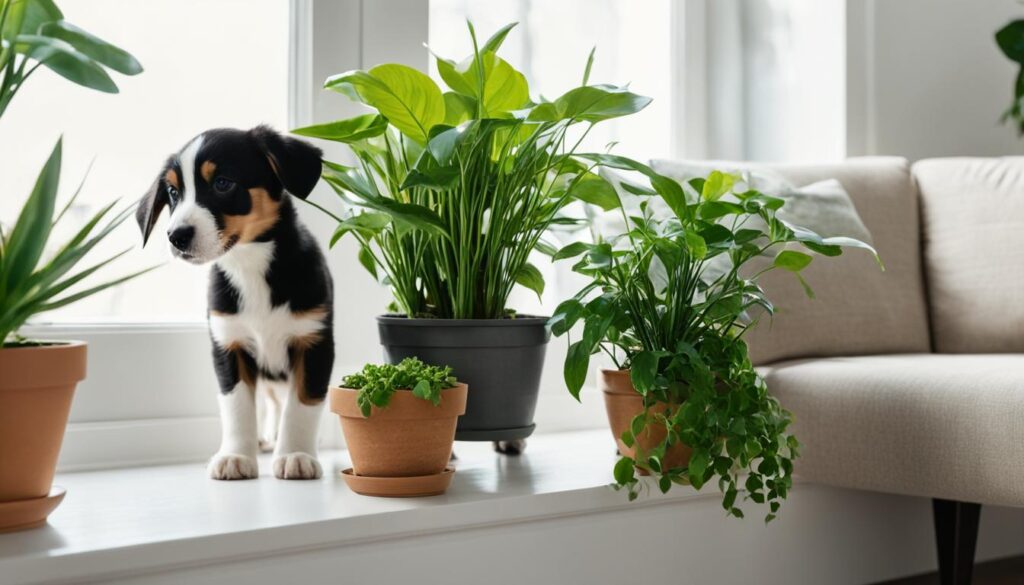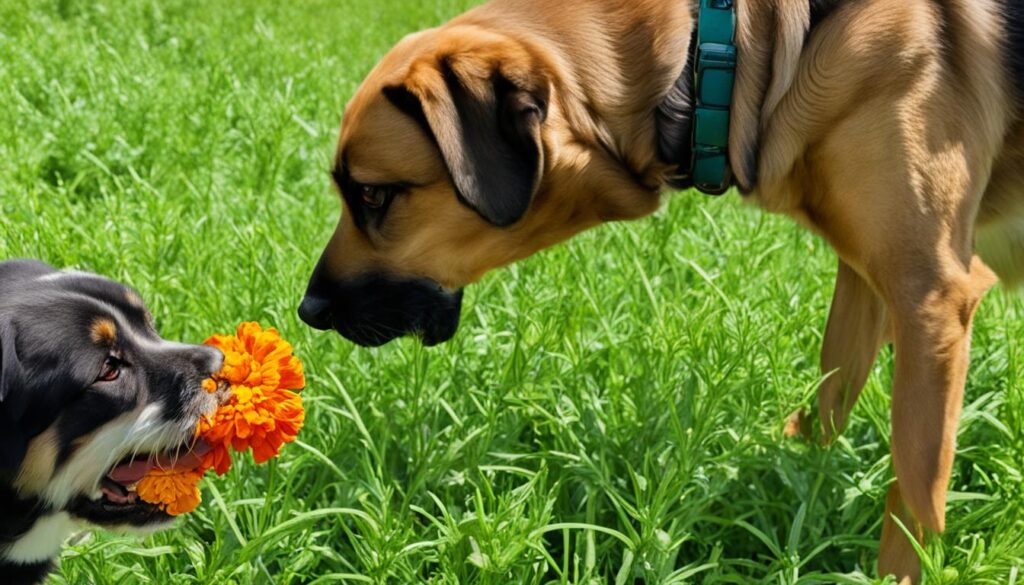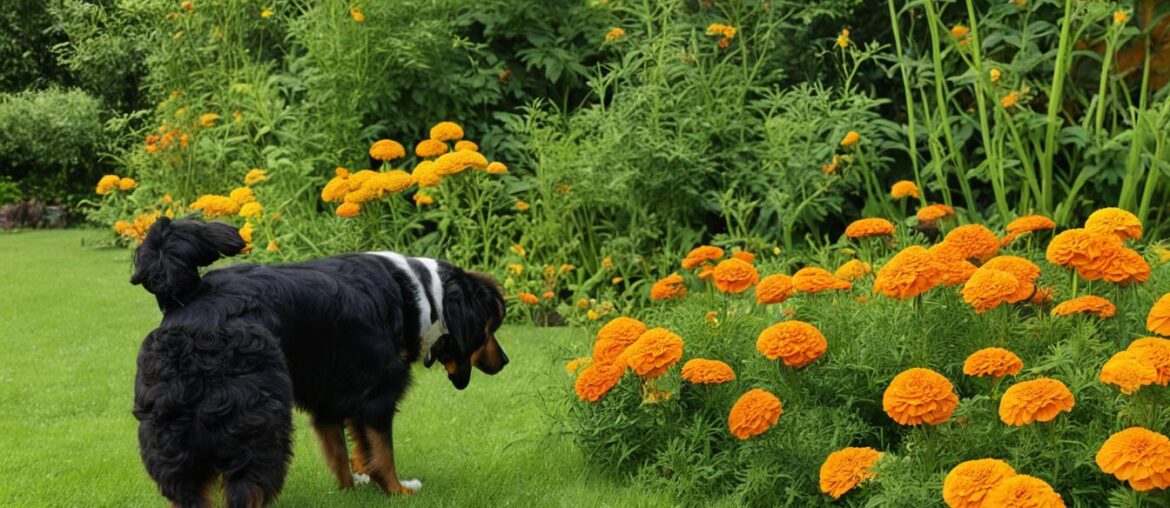Gardens adorned with vibrant flowers bring joy to dog owners, but have you ever wondered if marigolds are safe for your furry friends? In this article, I will explore the potential toxicity of marigolds to dogs and provide essential information to ensure the well-being of your canine companions.
Key Takeaways:
- Marigolds, particularly certain species within the Tagetes family, can be mildly toxic to dogs when ingested.
- Ingestion of marigolds may result in gastrointestinal upset, while contact with the plant can cause temporary skin irritation.
- However, marigold toxicity is generally not life-threatening for dogs.
- It is advisable to keep marigolds out of your dog’s reach and consult a veterinarian if ingestion or concerning symptoms occur.
- Creating a pet-friendly environment by selecting non-toxic houseplants is essential in ensuring the safety and happiness of your four-legged companions.
Understanding the Toxicity of Marigolds
Marigolds, specifically certain varieties within the Tagetes species, can be mildly toxic to dogs when ingested. The ingestion of marigolds may lead to mild irritation in the gastrointestinal tract. It is important to note that the toxicity level of marigolds is considered mild and not life-threatening for dogs. If a dog consumes a large amount of marigold plant, especially a toxic species, it may cause discomfort but is not considered lethal. It is advisable to seek veterinary guidance if your dog has ingested a significant amount of marigolds or is experiencing concerning symptoms.
Potential Risks of Marigold Exposure to Dogs

Marigold exposure can pose risks to dogs, especially if they come into contact with the plant’s fur and skin. The sap of the marigold plant can cause irritation when in contact with a dog’s skin. Although the effects of marigold exposure are not life-threatening, dogs may experience discomfort if they come into contact with this plant. It is important to ensure that dogs are not exposed to marigolds to prevent any potential skin irritation or discomfort.
Identifying Safe and Toxic Plants for Pets

As responsible pet owners, it is crucial to be aware of the plants that are safe and toxic for our beloved cats and dogs. While marigolds may have mild toxicity in dogs, there are several other plants that can be highly toxic to our furry companions.
Some examples of toxic plants for both cats and dogs include pink and yellow oleander, aloe vera, azaleas, cyclamen, and tulips. These plants can pose serious health risks if ingested by our pets. To ensure the safety of our furry friends, it is recommended to consult reputable resources such as the American Society for the Prevention of Cruelty to Animals (ASPCA) for a comprehensive list of toxic plants.
| Safe Houseplants for Cats and Dogs | Toxic Plants for Pets |
|---|---|
|
|
By choosing pet-friendly houseplants, we can enhance the beauty of our indoor spaces while ensuring the safety of our pets. Spider plants, ferns, bromeliads, marigolds, and moon orchids are all safe options for cats and dogs. However, it is always recommended to verify the safety of a specific plant before introducing it to our pet’s environment.
Remember, our pets rely on us to create a secure and comfortable living space for them. By understanding which plants are safe and toxic for our cats and dogs, we can better protect them from potential harm.
Pet-Friendly Houseplants

When it comes to creating an indoor garden that is safe for your furry companions, there are several houseplants that you can choose from. These plants not only add beauty to your home but also provide a safe environment for your cats and dogs. Let’s take a look at some of the pet-friendly houseplants:
1. Spider Plants
Spider plants (Chlorophytum comosum) are a popular choice among pet owners due to their non-toxic nature. These plants feature long, arching leaves with green and white stripes, adding a touch of elegance to any room. Spider plants are known to improve indoor air quality and are safe for both cats and dogs.
2. Ferns
Ferns are not only beautiful but also safe for pets. Varieties such as Boston ferns (Nephrolepis exaltata) and maidenhair ferns (Adiantum spp.) are excellent choices. These plants thrive in medium to low light conditions and are known for their lush, feathery foliage.
3. Bromeliads
Bromeliads are colorful, exotic plants that are safe for cats and dogs. Their vibrant flowers and striking foliage make them a popular choice for indoor gardens. Bromeliads, such as the Neoregelia and Guzmania species, are easy to care for and can add a tropical touch to your home.
4. Marigolds
Marigolds (Tagetes spp.) are not only safe for pets but also add a burst of vibrant color to your indoor garden. These cheerful flowers come in various shades of yellow and orange, making them a visually appealing choice. Marigolds also have mosquito-repellent properties, making them a great addition to outdoor spaces.
5. Moon Orchids
Moon orchids (Phalaenopsis spp.) are elegant, pet-friendly houseplants that can thrive indoors with proper care. These orchids produce beautiful, long-lasting flowers in shades of white, pink, and purple. Moon orchids are low-maintenance and can bring a touch of sophistication to any living space.
For a comprehensive list of pet-friendly houseplants, refer to the American Society for the Prevention of Cruelty to Animals (ASPCA) website. Remember to always research and confirm the safety of a specific plant before introducing it into your home. With these pet-friendly houseplants, you can create a delightful indoor garden while ensuring the well-being of your beloved pets.
| Plant | Description |
|---|---|
| Spider Plants | Long, arching leaves with green and white stripes; improves indoor air quality. |
| Ferns | Lush, feathery foliage; thrives in medium to low light conditions. |
| Bromeliads | Colorful, exotic plants; vibrant flowers and striking foliage. |
| Marigolds | Vibrant flowers in shades of yellow and orange; mosquito-repellent properties. |
| Moon Orchids | Elegant, long-lasting flowers in shades of white, pink, and purple; low-maintenance. |
Understanding Pet Behavior and Plant Chewing

Dogs and cats have a natural curiosity that can lead them to chew on plants as a way to explore their surroundings. While dogs may show interest in eating marigolds, it is important to discourage this behavior as marigolds are not part of their regular diet. Both cats and dogs may also consume grass, and it is believed to aid in digestion. Providing safe alternatives like cat grass for cats and ensuring a balanced diet for dogs can help prevent the ingestion of potentially harmful plants.
It is crucial to understand that not all plants are safe for pets to chew on. Some plants, including marigolds, can be mildly toxic when ingested in large quantities. It is important to monitor your pet’s behavior and discourage them from chewing on plants that may be harmful. By providing appropriate alternatives and ensuring a pet’s diet is properly balanced, you can help protect your furry friends from the risks associated with plant chewing.
“While dogs may show interest in eating marigolds, it is important to discourage this behavior as marigolds are not part of their regular diet.”
Remember, the health and safety of your pets should always be a top priority. If you have concerns about your pet’s behavior or if you suspect they have ingested a potentially harmful plant, it is best to consult with a veterinarian for guidance.
Recognizing the Symptoms of Plant Poisoning in Pets

If a pet has ingested a toxic plant, it may display various symptoms that can indicate poisoning. These symptoms can range from mild discomfort to severe reactions. It is essential for pet owners to be vigilant and recognize the signs to ensure prompt veterinary care.
Symptoms of Plant Poisoning in Pets:
- Lethargy
- Loss of appetite
- Vomiting
- Diarrhea
- Seizures (in severe cases)
It is important to note that these symptoms may not be specific to marigold poisoning and can vary depending on the type of plant ingested. If your pet exhibits any of these symptoms after coming into contact with marigolds or any other potentially toxic plant, it is crucial to seek immediate veterinary assistance. Early recognition and treatment can greatly improve the chances of a successful recovery.
In addition to observing these symptoms, you can also check your pet’s gums for any signs of abnormality. Changes in gum color, such as pale or bluish discoloration, can indicate potential poisoning and require immediate attention.
Protecting Your Pet from Plant Poisoning

To ensure the safety of your furry companion, it is important to take measures to protect them from plant poisoning. Follow these guidelines to create a safe environment for your pet:
- Keep toxic plants out of reach: Remove any potentially toxic plants from your household or place them in areas that are inaccessible to your pets. This is especially important if you have a curious pet that likes to explore.
- Monitor your pet’s behavior: Regularly observe your pet’s behavior to ensure they are not showing interest in or attempting to chew on plants. If you notice any unusual behavior, take immediate action to prevent plant ingestion.
- Ensure a well-balanced diet: Providing your pet with a nutritious and well-balanced diet can help prevent them from seeking out alternative food sources, such as plants. Consult with your veterinarian to determine the best diet for your pet’s specific needs.
If you have any concerns about the safety of plants in your home or if your pet has accidentally ingested a plant, it is recommended to consult with a veterinarian or a pet poison helpline for guidance and assistance.
Common Toxic Plants for Dogs
| Plant | Toxicity Level |
|---|---|
| Azaleas | Highly toxic |
| Oleander | Highly toxic |
| Aloe Vera | Moderately toxic |
| Tulips | Mildly toxic |
| Marigolds (certain varieties) | Mildly toxic |
Note: The above table only highlights a few examples of common toxic plants for dogs. It is important to research and identify any potential toxic plants in your environment to ensure the safety of your beloved pet.
“The safety and well-being of our pets are our top priorities. By taking the necessary precautions and creating a safe environment, we can prevent plant poisoning and provide our pets with a healthy and happy life.” – Dr. Sarah Johnson, Veterinarian
Wrapping Up
In conclusion, marigolds can be mildly toxic to dogs when ingested, causing gastrointestinal upset. Skin irritation can also occur with contact. However, the effects of marigold exposure are generally not life-threatening. It is essential for pet owners to be aware of the potential risks and to take preventative measures to protect their pets from plant poisoning.
By selecting pet-friendly houseplants and ensuring a safe environment, pet owners can create a nurturing and non-toxic space for their furry companions. It is important to prioritize the safety of pets by keeping toxic plants out of reach and monitoring their behavior. Additionally, consulting with a veterinarian or pet poison helpline can provide guidance and assistance in cases of concern about plant toxicity or if a pet displays concerning symptoms.
Remember, the health and well-being of our pets depend on us, and being proactive in creating a safe environment is crucial. With proper care and attention, we can ensure that our furry friends thrive in a toxin-free environment. If you suspect your pet has ingested a toxic plant or is experiencing any alarming symptoms, seeking veterinary assistance is highly advised to ensure proper treatment and care.
FAQ
Are marigolds poisonous to dogs?
Certain varieties of marigolds, especially those within the Tagetes species, can be mildly toxic to dogs when ingested. While the toxicity level is considered mild and not life-threatening, it may cause gastrointestinal upset. It is advisable to seek veterinary guidance if your dog has ingested a significant amount of marigolds or is experiencing concerning symptoms.
What are the risks of marigold exposure to dogs?
Marigold exposure can pose risks to dogs, especially if they come into contact with the plant’s fur and skin. The sap of the marigold plant can cause skin irritation when in contact with a dog’s skin. Although the effects of marigold exposure are not life-threatening, dogs may experience discomfort if they come into contact with this plant.
Can dogs eat marigolds?
While dogs may show interest in eating marigolds, it is important to discourage this behavior as marigolds are not part of their regular diet. Marigolds may cause gastrointestinal upset when ingested, so it is best to prevent dogs from eating them.
What are some safe and toxic plants for pets?
Some safe houseplants for cats and dogs include spider plants, ferns, bromeliads, and marigolds. However, there are many plants that can be toxic to pets, such as pink and yellow oleander, aloe vera, azaleas, cyclamen, and tulips. It is important to consult resources such as the American Society for the Prevention of Cruelty to Animals (ASPCA) for a comprehensive list of toxic plants to ensure the safety of your pets.
Are there any pet-friendly houseplants?
Yes, there are several pet-friendly houseplants that are safe for cats and dogs. Some examples include spider plants, ferns, bromeliads, and marigolds. Moon orchids are also considered safe for pets. It is recommended to refer to the ASPCA website for a list of pet-friendly houseplants to ensure a safe environment for your pets.
Why do dogs and cats chew on plants?
Dogs and cats are naturally curious and may chew on plants as a way to explore their surroundings. While dogs may show interest in eating marigolds or other plants, it is important to discourage this behavior as it may cause gastrointestinal upset. Both cats and dogs may also consume grass, which is believed to aid in digestion.
What are the symptoms of plant poisoning in pets?
If a pet has ingested a toxic plant, it may display symptoms such as lethargy, loss of appetite, vomiting, diarrhea, and in severe cases, seizures. Checking the pet’s gums for any signs of abnormality, such as a change in color, can be an indicator of potential poisoning. If a pet exhibits any of these symptoms, immediate veterinary assistance should be sought to ensure proper treatment and care.
How can I protect my pet from plant poisoning?
To protect pets from plant poisoning, it is important to take precautions such as keeping toxic plants out of reach and creating a safe environment. Remove any potentially toxic plants from the household or place them in areas that are inaccessible to pets. Additionally, regular monitoring of the pet’s behavior and ensuring a well-balanced diet can help prevent accidental ingestion of harmful plants. If there are concerns about plant safety, consulting with a veterinarian or a pet poison helpline can provide guidance and assistance.
In conclusion, are marigolds safe for dogs?
In conclusion, marigolds can be mildly toxic to dogs when ingested, causing gastrointestinal upset. Skin irritation can also occur with contact. However, the effects of marigold exposure are generally not life-threatening. It is essential for pet owners to be aware of the potential risks and to take preventative measures to protect their pets from plant poisoning. By selecting pet-friendly houseplants and ensuring a safe environment, pet owners can create a nurturing and non-toxic space for their furry companions. If there are concerns about plant toxicity or if a pet displays concerning symptoms, seeking veterinary assistance is advised.






